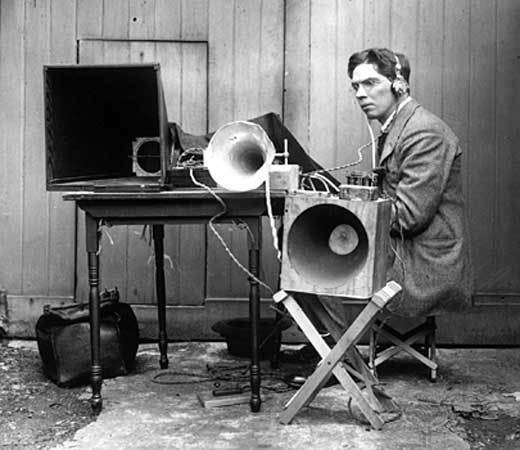“The telephone may develop to a stage where it is unnecessary to enter a special call-box. We shall think no more of telephoning to our office from our cars or railway-carriages than we do today of telephoning from our homes.” Archibald Low - 1937

This is Archibald Montgomery Low (1888-1956). Chances are you've never heard of this life-long Londoner. In an alternative universe, he is feted as the greatest inventor of the 20th century — up there with Edison and Marconi. His tinkerer's hands shaped so many new technologies, yet none ever quite came to fruition. He has faded into obscurity, but deserves much wider recognition.
The first television
The transmission of moving images was first pioneered by another great Londoner, John Logie Baird, working in Soho in 1926. Archibald Low almost beat him to it by 12 years. By 1914, Low had a working 'televista', which allowed fuzzy images to be viewed at distances of up to four miles. Here's a press cutting from 1914 describing the breakthrough:

The televista was, by all accounts, crude and expensive, but credible. Low thought it might also find military applications:
"There [is] no reason why, when the invention is further developed, the enemy could not be watched from immense distance and all their movements recorded. At sea, too, hostile ships would have their every movement seen. Surprise dashes would be made impossible.”
This was 1914, and the first world war was imminent. Low's technology was still too primitive to enter service, and he never found time to develop it further. Instead, he was recruited into military research and switched to working on his next inventions.
The first drones and guided missiles
The Wright Brothers had demonstrated heavier-than-air flight in late 1903. Just 14 years later, Archibald Low had a flyable drone. Working for the Royal Flying Corps (a precursor of the RAF), Low built and launched an aircraft that could be controlled from the ground. The world's first drone was to be used as a guided missile. Unfortunately, it proved temperamental and was never fielded. Pilotless aircraft would be further developed along Low's principles in the 1920s, but it would take a quarter of a century before the Nazis used the technology in a war setting.

Incidentally, the Germans were aware of Low's work at this time. He reportedly survived two assassination attempts in 1915, while working from his military laboratory on Paul Street, Shoreditch (a few doors down from the Londonist office, as it happens).
Rocket-powered motorbike
Low worked on dozens of gadgets in his career, including a rocket-powered bike. The contraption was first demonstrated to a 'crowd approaching cup final proportions' at Wembley on 3 October 1946.

The vehicle — described as the only rocket cycle in the world — performed well, travelling at increased speed with fire and sparks shooting out the back. Low saw the rocket cycle as a transport solution for the future, but it proved wildly impractical.
Visions of the future
Perhaps Low's most striking work was as a futurologist. As a 'consulting engineer', he was the go-to person for anyone who wanted a vision of the future. Every newspaper editor and journalist in the country seemingly had his phone number. Low's prophecies crop up time and again in the newspaper archive. Many are wide of the mark, but here's a random sample of his more prescient pronouncements:
Low predicts smartphones and txtspk (1922)
Speaking of a public ceremony in 2022: “In their pockets, apart from the inevitable wireless receiving set, will be a tiny pocket dictaphone, ready to take down at any moment a sound record of their thoughts... Perhaps a member of our deputation will make a speech... It will be delivered in a soft voice, very quickly, with many abbreviations in place of the long phrases that we know to-day.”
Low predicts the modern department store (1922)
“In the entrance to every large shop will be a moving stairway always in motion. Shoppers will no longer have to walk through clumsy doors and wait for slow lifts. They will step from the street on to the stairway."
Low predicts the internet (1928)
“When we can listen to the scenes and sounds of an Indian Bazaar, and in another moment be talking to a friend in South America, it will cure us of our horribly parochial attitude toward life… it will be of untold value for those who have documents to compare and transactions to complete, which require writing or designing of any kind.”
Low predicts Strictly Come Dancing (1935)
“Dancing in the future would probably be enjoyed in an armchair, with a seat swaying slightly, lights lowered, and possibly some drug. People would be too lazy to dance, and they would have to achieve the sensation in an armchair.”
Low's most striking visions of the future came in a 1922 article, partly quoted above. A time capsule had been planted beneath a new building on Regent Street, and Low was asked to imagine the delegation charged with reopening the capsule in 2022. For more on that vision of our own near-future, and the whereabout of the time capsule, see our previous article.
The author would love to hear from anyone with more information about Archibald Low's life and work. Please contact [email protected] with any comments.



